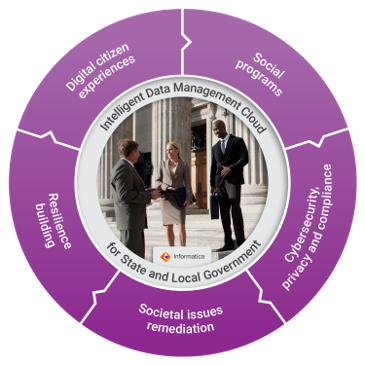Power Digital Citizen Services with the Informatica Intelligent Data Management Cloud for State and Local Government

A 2022 survey of State chief information officers (CIOs)1 reports that increased attention on digital government services and citizen experience is the top issue for them in the post-pandemic world. This is not surprising since this issue has ranked in the top three in the past few annual surveys. The need for a timely response to crises is the second top priority. The pandemic heightened the realization that legacy technologies failed to meet the required response during high demand. Thus, the priority and investment in legacy modernization climbed significantly in importance from previous surveys to number two.
Both issue areas are reflective of lessons learned during the pandemic. State and local government leaders were significantly challenged to make accurate and timely decisions during the crisis. They struggled to provide information to their constituents to keep them aware of the situation. This was the direct result of low pre-pandemic investments in data platforms and modern digital experiences for public-private collaboration.
Fortunately, the pandemic accelerated the pace of digital adoption in government agencies. Many agencies, especially public health, have learned the importance of data-driven analysis and insights. This helps them better understand and serve constituent needs. Using accurate, clean and complete data, public health agencies can track virus trends and offer timely vaccine and testing services. They can also drive faster, more confident decision-making.
But the survey also reflects that CIOs want more. They realize the power of analytics driven by complete and trusted data. They understand that it can drive positive impacts in several other areas of inherently governmental work. To meet this demand, Informatica is launching its Intelligent Data Management Cloud (IDMC) for State and Local Governments.
Drivers of Change for State and Local Government … and the Impeding Data Challenges

1. Digital Citizen Experiences – In a recent Traversant Group survey,2 74% of state CIOs said that they are expanding digital services to deliver better online experiences for citizens and agency employees. Providing a single digital data source across agencies helps increase citizens’ information access. A single and complete view also allows workers to provide faster, more comprehensive service. A successful example of this is Maryland’s mastery of citizen data across nine previously stove-piped programs. Today, over 5 million citizens are served daily with a single view of their profile across the programs. This allows for a one-stop shop to interact with multiple agencies.
To achieve better digital services, organizations need to rectify these common data challenges:
- Siloed, duplicate and incomplete views of citizen identity and information
- Poor data quality, which acts as a barrier to accurate insights
- The need to integrate hundreds of applications and data sources, including external and third-party data
- The need to modernize legacy information systems to unlock data
2. Social Programs (Fraud, Waste and Abuse and Improper Payments) – The Federal Government manages over 900 social programs, many of which funnel money to the states for execution. Unfortunately, an estimated $100M+ is lost annually3 due to improper payments to individuals. Untold billions of dollars are routinely reported lost due to fraudulent activity. While governments have made strides in reducing wasteful social program management, much remains to be done. Well-managed data is at the core of the solution.
To improve data management within these programs, data challenges to address include:
- Lack of a single view of risk to detect fraud, threat and misuse
- Lack of contextual insights/intelligence
- Lack of a complete view of individuals or businesses
- Manual data quality efforts
- Inability to share and sync data across apps, websites and agencies
3. Cybersecurity, Privacy, and Compliance – Agencies are required to comply with the growing number of privacy regulations across the states. They must have a trustworthy data framework to be able to secure, anonymize and protect citizen information. These activities are also essential to engender citizen trust in managing the vast amounts of personal data created and collected on them.
State and Local governments can leverage technology to build trust in their institutions by protecting citizen data. To do this, they must look for solutions that overcome or enable:
- Need to protect citizen information and audit data access
- Lack of single view of risks and threats
- Potential for data breaches
- Lack of data security and privacy by design in data pipelines
- Data security issues hindering modernization initiatives
4. Societal Issues Remediation – Reducing opioid addiction, homelessness and recidivism are a few of the systemic issues that can be improved upon by understanding and analyzing the underlying data. Recidivism alone can involve multiple data sources across the court systems, law enforcement, prison and parole boards. When siloed, this data is difficult to manually manipulate to gain insights to what services are working for this population. Without insight, policy and budgetary decisions can be well-meaning but ineffective. Evidence-based decisions are key to gaining ground on these important issues.
Frequent data challenges include a lack of:
- Data standards and interoperability
- Data collaboration and sharing
- Complete and accurate information across departments and agencies
- Immediate access to third-party and external data
5. Resilience Building – Governments want to be prepared for the next crisis. Leaders realized from the pandemic that shared, integrated and trusted data is vital to understanding a situation in real time. Data collaboration to anticipate, decide and act upon events is possible only when data is complete, accurate and timely. A modern data platform that can integrate, catalog, govern and master data at scale is the capability that must be available before the crisis hits.
Building a modern data platform for crisis response enables governments to surmount:
- Lack of data sharing and collaboration with partner emergency services, agencies and more
- Lack of access to real-time data
- Inability to quickly integrate external data like call records
- Fragmented and siloed data on devices, financial transactions, call data records and more
- Lack of unified view across people, objects, locations and more
Overcoming the Data Hurdles with the Informatica Intelligent Data Management Cloud for State and Local Government
The Informatica Intelligent Data Management Cloud™ (IDMC) for State and Local Government delivers a portfolio of data management capabilities. It assists agencies in modernizing and meeting the drivers of change with an AI-powered, end-to-end data management platform. The solution is independent and technology-neutral, allowing you to share, deliver and democratize data across your organization. This comprehensive solution helps you reimagine and define how you manage data and use it to support innovation.
When considering choices for digital modernization to provide data insights and value across the many government use cases, capabilities should include:
- The ability to discover, prepare, and ingest data from a multitude of sources in various formats to include data from cloud applications (SaaS), on-premises sources (databases, mainframes), and real-time streaming sources (IoT, machine data, logs)
- A unified view of data and insight across critical mission and business domains with data integration and multi-domain master data management and 360 SaaS applications (e.g., citizen, utilities, transportation, emergency services and more)
- Integration throughout external data, third-party data and the hundreds of applications used by agencies
- The capability to automate and streamline business processes at scale with data and application integration and hyperautomation capabilities
- Prioritization of internal and external data sharing (seamless inter-agency cross-registrations) with a centralized, self-service data marketplace
- Protection of citizen and other sensitive data and compliance facilitation for the California Consumer Privacy Act (CCPA), HIPAA and other global, federal and state privacy regulations
- The cleansing, standardization, enrichment and validation of data with out-of-the-box data quality rules
- Reduction in time to value with out-of-the-box data management accelerators (data quality accelerator, data management for crisis response, AI-powered automation and more)
The public expects their government leaders to deploy technology solutions that help agencies communicate and respond ably to change and engage with citizens. Modern agencies are increasingly deploying predictive analytics that automatically detect fraud, waste and abuse of social programs to ensure the money gets to those who need it most. They are providing end-to-end citizen experiences with democratized data and real-time analysis. They are making data-informed decisions to improve systemic societal issues. They are building resilience with modern data platforms to ensure crisis preparedness. What is your agency doing?
To find out more about IDMC for State and Local Government, read our brochure, “Enhance Citizen Services and Power Government Innovation with Connected Data,” and check out our web page.
1https://www.nascio.org/resource-center/resources/the-2022-state-cio-survey/
2https://www.traversantgroup.com/blog/top-5-nascio-survey
3https://www.paymentaccuracy.gov/payment-accuracy-high-priority-programs/








